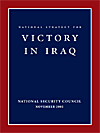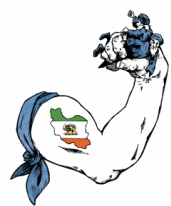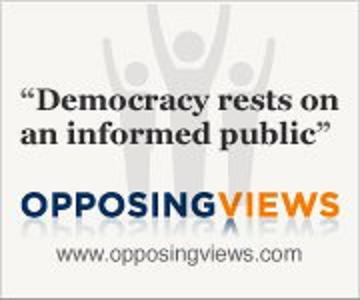Da Plan Da Plan!
National Strategy
for Victory
in Iraq
Topic: Iraq War
Tatoo is hollering Da Plan, Da Plan

Lots of strident voices have been raised, demanding
Da Plan. Well here it is.
The full document is a 38 page pdf file.
Below is the Executive Summary. Enjoy.
It's not Fantasy Island, it's
The National Strategy for Victory in Iraq
Hat Tip Captain's Quarters at Read My Lips: No New TimetablesHe also released a book on the Iraq war strategy for those who just haven't paid any attention over the past two years. Bush and the White House should have just subtitled it "FOR THOSE WHO STILL THINK THAT THE US MILITARY DEPLOYS HALFWAY AROUND THE WORLD WITHOUT A PLAN FOR SUCCESS".
November 30, 2005
The following document articulates the broad strategy the President set forth in 2003 and provides an update on our progress as well as the challenges remaining.
"The United States has no intention of determining the precise form of Iraq's new government. That choice belongs to the Iraqi people. Yet, we will ensure that one brutal dictator is not replaced by another. All Iraqis must have a voice in the new government, and all citizens must have their rights protected.
Rebuilding Iraq will require a sustained commitment from many nations, including our own: we will remain in Iraq as long as necessary, and not a day more."
-- President George W. Bush
February 26, 2003
Table of Contents

November 30, 2005
National Strategy for Victory in Iraq
 Full PDF Document (386KB)
Full PDF Document (386KB)
Executive Summary
PART I
Strategic Overview
- Victory in Iraq Defined
- Victory in Iraq is a Vital U.S. Interest
- The Benefits of Victory in Iraq
- The Consequences of Failure
- Our Enemies and Their Goals
- The Strategy of Our Enemies
- Our Strategy for Victory is Clear
A. The Political Track (Isolate, Engage, Build)
B.
The Security Track (Clear, Hold, Build)
C.
The Economic Track (Restore, Reform, Build)
- This Strategy is Integrated, and its Elements are Mutually Reinforcing
- Victory Will Take Time
- Why Our Strategy Is (and Must Be) Conditions-Based
- Our Strategy Tracks and Measures Progress
PART II
Strategy in Detail
- The Political Track in Detail
- The Security Track in Detail
- The Economic Track in detail
- Organization for Victory
APPENDIX
Executive Summary
OUR NATIONAL STRATEGY FOR VICTORY IN IRAQ:
Helping the Iraqi People Defeat the Terrorists and Build an Inclusive Democratic State
- Victory in Iraq is Defined in Stages
- Short term, Iraq is making steady progress in fighting terrorists, meeting political milestones, building democratic institutions, and standing up security forces.
- Medium term, Iraq is in the lead defeating terrorists and providing its own security, with a fully constitutional government in place, and on its way to achieving its economic potential.
- Longer term, Iraq is peaceful, united, stable, and secure, well integrated into the international community, and a full partner in the global war on terrorism.
- Victory in Iraq is a Vital U.S. Interest
- Iraq is the central front in the global war on terror. Failure in Iraq will embolden terrorists and expand their reach; success in Iraq will deal them a decisive and crippling blow.
- The fate of the greater Middle East -- which will have a profound and lasting impact on American security -- hangs in the balance.
- Failure is Not an Option
- Iraq would become a safe haven from which terrorists could plan attacks against America, American interests abroad, and our allies.
- Middle East reformers would never again fully trust American assurances of support for democracy and human rights in the region -- a historic opportunity lost.
- The resultant tribal and sectarian chaos would have major consequences for American security and interests in the region.
- The Enemy Is Diffuse and Sophisticated
- The enemy is a combination of rejectionists, Saddamists, and terrorists affiliated with or inspired by Al Qaida. Distinct but integrated strategies are required to defeat each element.
- Each element shares a common short-term objective -- to intimidate, terrorize, and tear down -- but has separate and incompatible long-term goals.
- Exploiting these differences within the enemy is a key element of our strategy.
- Our Strategy for Victory is Clear
- We will help the Iraqi people build a new Iraq with a constitutional, representative government that respects civil rights and has security forces sufficient to maintain domestic order and keep Iraq from becoming a safe haven for terrorists. To achieve this end, we are pursuing an integrated strategy along three broad tracks, which together incorporate the efforts of the Iraqi government, the Coalition, cooperative countries in the region, the international community, and the United Nations.
- The Political Track involves working to forge a broadly supported national compact for democratic governance by helping the Iraqi government:
- Isolate enemy elements from those who can be won over to the political process by countering false propaganda and demonstrating to all Iraqis that they have a stake in a democratic Iraq;
- Engage those outside the political process and invite in those willing to turn away from violence through ever-expanding avenues of participation; and
- Build stable, pluralistic, and effective national institutions that can protect the interests of all Iraqis, and facilitate Iraq's full integration into the international community.
- The Security Track involves carrying out a campaign to defeat the terrorists and neutralize the insurgency, developing Iraqi security forces, and helping the Iraqi government:
- Clear areas of enemy control by remaining on the offensive, killing and capturing enemy fighters and denying them safe-haven;
- Hold areas freed from enemy influence by ensuring that they remain under the control of the Iraqi government with an adequate Iraqi security force presence; and
- Build Iraqi Security Forces and the capacity of local institutions to deliver services, advance the rule of law, and nurture civil society.
- The Economic Track involves setting the foundation for a sound and self-sustaining economy by helping the Iraqi government:
- Restore Iraq's infrastructure to meet increasing demand and the needs of a growing economy;
- Reform Iraq's economy, which in the past has been shaped by war, dictatorship, and sanctions, so that it can be self-sustaining in the future; and
- Build the capacity of Iraqi institutions to maintain infrastructure, rejoin the international economic community, and improve the general welfare of all Iraqis.
- This Strategy is Integrated and its Elements are Mutually Reinforcing
- Progress in each of the political, security, and economic tracks reinforces progress in the other tracks.
- For instance, as the political process has moved forward, terrorists have become more isolated, leading to more intelligence on security threats from Iraqi citizens, which has led to better security in previously violent areas, a more stable infrastructure, the prospect of economic progress, and expanding political participation.
- Victory Will Take Time
- Our strategy is working: Much has been accomplished in Iraq, including the removal of Saddam's tyranny, negotiation of an interim constitution, restoration of full sovereignty, holding of free national elections, formation of an elected government, drafting of a permanent constitution, ratification of that constitution, introduction of a sound currency, gradual restoration of neglected infrastructure, the ongoing training and equipping of Iraqi security forces, and the increasing capability of those forces to take on the terrorists and secure their nation.
- Yet many challenges remain: Iraq is overcoming decades of a vicious tyranny, where governmental authority stemmed solely from fear, terror, and brutality.
- It is not realistic to expect a fully functioning democracy, able to defeat its enemies and peacefully reconcile generational grievances, to be in place less than three years after Saddam was finally removed from power.
- Our comprehensive strategy will help Iraqis overcome remaining challenges, but defeating the multi-headed enemy in Iraq -- and ensuring that it cannot threaten Iraq's democratic gains once we leave -- requires persistent effort across many fronts.
- Our Victory Strategy Is (and Must Be) Conditions Based
- With resolve, victory will be achieved, although not by a date certain.
- No war has ever been won on a timetable and neither will this one.
- But lack of a timetable does not mean our posture in Iraq (both military and civilian) will remain static over time. As conditions change, our posture will change.
- We expect, but cannot guarantee, that our force posture will change over the next year, as the political process advances and Iraqi security forces grow and gain experience.
- While our military presence may become less visible, it will remain lethal and decisive, able to confront the enemy wherever it may organize.
- Our mission in Iraq is to win the war. Our troops will return home when that mission is complete.
OUR NATIONAL STRATEGY FOR VICTORY IN IRAQ:
Helping the Iraqi People Defeat the Terrorists and Build an Inclusive Democratic State
PART I -- STRATEGIC OVERVIEW
"Our mission in Iraq is clear. We're hunting down the terrorists. We're helping Iraqis build a free nation that is an ally in the war on terror. We're advancing freedom in the broader Middle East. We are removing a source of violence and instability, and laying the foundation of peace for our children and grandchildren."
-- President George W. Bush
June 28, 2003
VICTORY IN IRAQ DEFINED
As the central front in the global war on terror, success in Iraq is an essential element in the long war against the ideology that breeds international terrorism. Unlike past wars, however, victory in Iraq will not come in the form of an enemy's surrender, or be signaled by a single particular event -- there will be no Battleship Missouri, no Appomattox. The ultimate victory will be achieved in stages, and we expect:
- In the short term:
- An Iraq that is making steady progress in fighting terrorists and neutralizing the insurgency, meeting political milestones; building democratic institutions; standing up robust security forces to gather intelligence, destroy terrorist networks, and maintain security; and tackling key economic reforms to lay the foundation for a sound economy.
- In the medium term:
- An Iraq that is in the lead defeating terrorists and insurgents and providing its own security, with a constitutional, elected government in place, providing an inspiring example to reformers in the region, and well on its way to achieving its economic potential.
- In the longer term:
- An Iraq that has defeated the terrorists and neutralized the insurgency.
- An Iraq that is peaceful, united, stable, democratic, and secure, where Iraqis have the institutions and resources they need to govern themselves justly and provide security for their country.
- An Iraq that is a partner in the global war on terror and the fight against the proliferation of weapons of mass destruction, integrated into the international community, an engine for regional economic growth, and proving the fruits of democratic governance to the region.
VICTORY IN IRAQ IS A VITAL U.S. INTEREST
- The war on terrorism is the defining challenge of our generation, just as the struggle against communism and fascism were challenges of the generations before. As with those earlier struggles, the United States is fully committed to meeting this challenge. We will do everything it takes to win.
- Prevailing in Iraq will help us win the war on terror.
- The terrorists regard Iraq as the central front in their war against humanity. And we must recognize Iraq as the central front in our war on terror.
- Osama Bin Laden has declared that the "third world war...is raging" in Iraq, and it will end there, in "either victory and glory, or misery and humiliation."
- Bin Laden's deputy Ayman al-Zawahiri has declared Iraq to be "the place for the greatest battle," where he hopes to "expel the Americans" and then spread "the jihad wave to the secular countries neighboring Iraq."
- Al Qaida in Iraq, led by Abu Musab al-Zarqawi, has openly declared that "we fight today in Iraq, and tomorrow in the Land of the Two Holy Places, and after there the west."
- As the terrorists themselves recognize, the outcome in Iraq -- success or failure -- is critical to the outcome in the broader war on terrorism.
- What happens in Iraq will influence the fate of the Middle East for generations to come, with a profound impact on our own national security.
- Ceding ground to terrorists in one of the world's most strategic regions will threaten the world's economy and America's security, growth, and prosperity, for decades to come.
- An emerging democracy in Iraq will change the regional status quo that for decades has bred alienation and spawned the transnational terrorism that targets us today.
- The terrorists' perverse ideology is countered by the advance of freedom and the recognition that all people have the right to live under democracy and the rule of law, free from oppression and fear, with hope and optimism for the future.
THE BENEFITS OF VICTORY IN IRAQ
- Helping the people of Iraq is the morally right thing to do -- America does not abandon its friends in the face of adversity. Helping the people of Iraq, however, is also in our own national interest.
- If we and our Iraqi partners prevail in Iraq, we will have made America:
- Safer...
- by removing Saddam Hussein, a destabilizing force in a vital region, a ruthless dictator who had a history of pursuing and even using weapons of mass destruction, was a state sponsor of terror, had invaded his neighbors, and who was violently opposed to America;
- by depriving terrorists of a safe haven from which they could plan and launch attacks against the United States and American interests;
- by delivering a strategic setback to the terrorists and keeping them on the run;
- by delivering a decisive blow to the ideology that fuels international terrorism, proving that the power of freedom is stronger than a perverse vision of violence, hatred, and oppression.
- Stronger...
- by demonstrating to our friends and enemies the reliability of U.S. power, the strength of our commitment to our friends, and the tenacity of our resolve against our enemies;
- by securing a new friend and partner in the fight against terrorism in the heart of the Middle East.
- More Certain of its Future ...
- politically, by bolstering democratic reformers -- and the prospects for peaceful, democratic governments -- in a region that for decades has been a source of instability and stagnation;
- economically, by facilitating progressive reform in the region and depriving terrorists control over a hub of the world's economy.
THE CONSEQUENCES OF FAILURE
- If we and our Iraqi partners fail in Iraq, Iraq will become:
- A safe haven for terrorists as Afghanistan once was, only this time in some of the world's most strategic territory, with vast natural resources to exploit and to use to fund future attacks.
- A country where oppression -- and the brutal imposition of inhumane practices, such as those of the Taliban in Afghanistan -- is pervasive.
- A failed state and source of instability for the entire Middle East, with all the attendant risks and incalculable costs for American security and prosperity.
- Furthermore, if we and our Iraqi partners fail in Iraq, the terrorists will have:
- Won a decisive victory over the United States, vindicating their tactics of beheadings, suicide bombings, and ruthless intimidation of civilians, inviting more deadly attacks against Americans and other free people across the globe.
- Placed the American people in greater danger by destabilizing a vital region, weakening our friends, and clearing the way for terrorist attacks here at home. The terrorists will be emboldened in their belief that America cannot stand and fight, but will cut and run in the face of adversity.
- Called into question American credibility and commitment in the region and the world. Our friends and foes alike would doubt our staying power, and this would damage our efforts to counter other security threats and to advance other economic and political interests worldwide.
- Since 1998, Al Qaida has repeatedly cited Vietnam, Beirut, and Somalia, as examples to encourage more attacks against America and our interests overseas.
- Weakened the growing democratic impulses in the region. Middle East reformers would never again fully trust American assurances of support for democracy and pluralism in the region -- a historic opportunity, central to America's long-term security, forever lost.
If we retreat from Iraq, the terrorists will pursue us and our allies, expanding the fight to the rest of the region and to our own shores.
OUR ENEMIES AND THEIR GOALS
- The enemy in Iraq is a combination of rejectionists, Saddamists, and terrorists affiliated with or inspired by Al Qaida. These three groups share a common opposition to the elected Iraqi government and to the presence of Coalition forces, but otherwise have separate and to some extent incompatible goals.
- Rejectionists are the largest group. They are largely Sunni Arabs who have not embraced the shift from Saddam Hussein's Iraq to a democratically governed state. Not all Sunni Arabs fall into this category. But those that do are against a new Iraq in which they are no longer the privileged elite. Most of these rejectionists opposed the new constitution, but many in their ranks are recognizing that opting out of the democratic process has hurt their interests.
- We judge that over time many in this group will increasingly support a democratic Iraq provided that the federal government protects minority rights and the legitimate interests of all communities.
- Saddamists and former regime loyalists harbor dreams of reestablishing a Ba'athist dictatorship and have played a lead role in fomenting wider sentiment against the Iraqi government and the Coalition.
- We judge that few from this group can be won over to support a democratic Iraq, but that this group can be marginalized to the point where it can and will be defeated by Iraqi forces.
- Terrorists affiliated with or inspired by Al Qaida make up the smallest enemy group but are the most lethal and pose the most immediate threat because (1) they are responsible for the most dramatic atrocities, which kill the most people and function as a recruiting tool for further terrorism and (2) they espouse the extreme goals of Osama Bin Laden -- chaos in Iraq which will allow them to establish a base for toppling Iraq's neighbors and launching attacks outside the region and against the U.S. homeland.
- The terrorists have identified Iraq as central to their global aspirations. For that reason, terrorists and extremists from all parts of the Middle East and North Africa have found their way to Iraq and made common cause with indigenous religious extremists and former members of Saddam's regime. This group cannot be won over and must be defeated -- killed or captured -- through sustained counterterrorism operations.
- There are other elements that threaten the democratic process in Iraq, including criminals and Shi'a religious extremists, but we judge that such elements can be handled by Iraqi forces alone and/or assimilated into the political process in the short term.
THE STRATEGY OF OUR ENEMIES
- Despite their competing goals, these disparate enemy elements share a common operational concept: Intimidate, coerce, or convince the Iraqi public not to support the transition to democracy by persuading them that the nascent Iraqi government is not competent and will be abandoned by a Coalition that lacks the stomach for this fight.
- The enemy's strategy, in short, is to intimidate, terrorize, and tear down -- a strategy with short-term advantage because it is easier to tear down than to build up. But this strategy is not sustainable in the long term because it is rejected by the overwhelming mass of the Iraqi population.
- Enemy Lines of Action. The enemy seeks to ...
- Weaken the Coalition's resolve, and our resolve at home, through barbaric mass-casualty attacks, public slaughter of Iraqi civilians and hostages, infliction of casualties on Coalition forces, and use of the media to spread propaganda and intimidate adversaries.
- Destroy confidence in the Iraqi government by sabotaging key essential service (oil and electricity) nodes and by derailing the political process.
- Damage trust in Iraqi Security Forces through propaganda, infiltration, and barbaric attacks on the weak and the innocent.
- Sabotage Iraqi unity through propaganda against the Shi'a majority punctuated with attacks intended to spark sectarian conflict and civil war.
- Establish safe havens to plan attacks and conduct intimidation campaigns.
- Expand the fight to neighboring states and beyond.
OUR STRATEGY FOR VICTORY IS CLEAR
- Our Strategy is Clear: We will help the Iraqi people build a new Iraq with a constitutional, representative government that respects civil rights and has security forces sufficient to maintain domestic order and keep Iraq from becoming a safe haven for terrorists. To achieve this end, we are pursuing a comprehensive approach that involves the integrated efforts of the entire United States Government, the Iraqi government, and Coalition governments, and encourages the active involvement of the United Nations, other international organizations, and supportive regional states.
- Our strategy involves three integrated tracks -- political, security, and economic -- each with separate objectives, but together helping Iraqis to defeat the terrorists, Saddamists, and rejectionists, and secure a new democratic state in Iraq.
The Political Track
(Isolate, Engage, Build)
- Objective: To help the Iraqi people forge a broadly supported national compact for democratic government, thereby isolating enemy elements from the broader public.
- To achieve this objective, we are helping the Iraqi government:
- Isolate hardened enemy elements from those who can be won over to a peaceful political process by countering false propaganda and demonstrating to the Iraqi people that they have a stake in a viable, democratic Iraq.
- Engage those outside the political process and invite in those willing to turn away from violence through ever-expanding avenues of peaceful participation.
- Build stable, pluralistic, and effective national institutions that can protect the interests of all Iraqis, and facilitate Iraq's full integration into the international community.
The Security Track
(Clear, Hold, Build)
- Objective: To develop the Iraqis' capacity to secure their country while carrying out a campaign to defeat the terrorists and neutralize the insurgency.
- To achieve this objective, we are helping the Iraqi government:
- Clear areas of enemy control by remaining on the offensive, killing and capturing enemy fighters and denying them safe-haven.
- Hold areas freed from enemy control by ensuring that they remain under the control of a peaceful Iraqi government with an adequate Iraqi security force presence.
- Build Iraqi Security Forces and the capacity of local institutions to deliver services, advance the rule of law, and nurture civil society.
The Economic Track
(Restore, Reform, Build)
- Objective: To assist the Iraqi government in establishing the foundations for a sound economy with the capacity to deliver essential services.
- To achieve this objective, we are helping the Iraqi government:
- Restore Iraq's neglected infrastructure so it can meet increasing demand and the needs of a growing economy.
- Reform Iraq's economy, which has been shaped by war, dictatorship, and sanctions, so that it can be self-sustaining in the future.
- Build the capacity of Iraqi institutions to maintain infrastructure, rejoin the international economic community, and improve the general welfare of all Iraqis.
THIS STRATEGY IS INTEGRATED, AND ITS ELEMENTS ARE
MUTUALLY REINFORCING
- Progress along one of the political, security, and economic tracks reinforces progress along the other tracks. For example:
- As the political process has moved forward, terrorists have become more isolated, leading to more intelligence on their leadership and hideouts from Iraqi citizens, which has led to better security in previously violent areas, a more stable infrastructure, the prospect of economic progress, and expanding political participation.
- As security operations in Fallujah, Mosul, Tal Afar, and elsewhere have killed or led to the capture of high-level terrorists and insurgents, residents in those areas have come forward to participate in the political process, registering and turning out to vote in vast numbers, and providing local residents a meaningful voice in the new Iraq.
- As economic activities have progressed, ordinary citizens have returned to normal life and developed a stake in a peaceful Iraq and thus become motivated to support the political process and cooperate with security forces,
- Part II of this paper will discuss the three tracks -- political, security, and economic -- in more detail, so Americans can better understand the elements of our vital mission, the nature of our strategy, why we believe this strategy will succeed, the progress we are making, and how our government is organized to help Iraqis ensure lasting victory in Iraq.
VICTORY WILL TAKE TIME
- Our Strategy Is Working. Much has been accomplished in Iraq, including the removal of Saddam's tyranny, negotiation of an interim constitution, restoration of full sovereignty, holding of free national elections, formation of an elected government, drafting of a permanent constitution, ratification of that constitution, introduction of a sound currency, gradual restoration of Iraq's neglected infrastructure, and the ongoing training and equipping of Iraq's security forces.
- Yet many challenges remain:
- Iraq is overcoming decades of a vicious tyranny, under which governmental authority stemmed solely from fear, terror, and brutality. Saddam Hussein devastated Iraq, wrecked its economy, ruined its infrastructure, and destroyed its human capital. It is not realistic to expect a fully functioning democracy, able to defeat its enemies and peacefully reconcile generational grievances, to be in place less than three years after Saddam was finally removed from power.
- We and the Iraqi people are fighting a ruthless enemy, which is multi-headed, with competing ambitions and differing networks. Getting an accurate picture of this enemy, understanding its makeup and weaknesses, and defeating it, requires patience, persistence, and determined effort along all three strategic tracks.
- Terrorism and insurgencies historically take many years to defeat, through a combination of political, economic, and military tools. Iraq's violence is different from other such conflicts, where insurgents often had unified command and control or mounted a successful campaign to win the hearts and minds of the population. Nonetheless, Iraq is likely to struggle with some level of violence for many years to come.
- The neighborhood is inhospitable. Iran and Syria have failed to provide support to Iraq's new government and have in many ways actively undermined it. The region, while including some cooperative actors, has only recently mobilized to support the emergence of a democratic and stable Iraq.
- The Sunni community is still searching for strong, reliable leadership. Although many Sunnis also suffered under Saddam, leaders from their community generally associated with the Ba'ath Party, not the opposition to the regime. The Sunni religious community, moreover, is less hierarchical and more dispersed, which is reflected in Sunni politics. As a result of these realities, few Sunni leaders have spoken for the larger Sunni community in Iraq. Elections in December will produce elected Sunni leaders who can represent their community with legitimate authority.
- Many Sunnis are also coming to terms with the reality that their community no longer monopolizes power in Iraq. They are grappling with their role in a democratic country in which they are a minority, albeit with constitutional protections for minority rights and interests.
- Many of Iraq's communities remain skeptical of the central government and nervous about the creation of an Iraqi state where power is concentrated in Baghdad. Their allegiance to a united Iraqi government will depend upon the central government demonstrating the will and capability to govern effectively and fairly on behalf of all Iraqis.
- Earlier efforts to correct past wrongs have sometimes alienated Sunnis who were not complicit with Saddam's crimes. Iraq's leaders need to find a middle ground -- between pursuing justice for every past wrong and leaving the past unexamined.
- With democratization has come the emergence of new groups, not all of whom have shared the goal of a free, pluralistic, and democratic Iraq. Some groups -- like members of the Mahdi Militia -- have sought to maximize discontent with the Coalition presence and have at times clashed violently with other parties.
- The continued existence and influence of militias and armed groups, often affiliated with political parties, hamper the rule of law in some parts of Iraq. These groups have also infiltrated the police forces and sparked violent exchanges in areas of the country that are otherwise peaceful.
- Iraq's economy is still shackled with many vestiges of a highly centralized economy and stagnant and corrupt institutions. Creating new institutions, reforming old ones, and developing new policies will be necessary to encourage economic growth. The prosperity of average Iraqis will be enhanced only if Iraq reduces the massive subsidy programs that burden its economy.
WHY OUR STRATEGY IS (AND MUST BE) CONDITIONS-BASED
- Success in the short, medium, and long run will depend on progress in overcoming these challenges and on the conditions on the ground in Iraq. Our strategy -- along the political, security, and economic tracks -- is establishing the conditions for victory. These conditions include:
- Progress in the Iraqi political process and the increasing willingness of Iraqis to forge political compromises;
- Consolidation of gains in the training of Iraqi Security Forces (ISF);
- Commitment to and implementation of economic reforms by Iraqi leaders;
- Increased cooperation of Iraq's neighbors;
- Expanded support from the international community;
- Continued support of the American people.
- Although we are confident of victory in Iraq, we will not put a date certain on when each stage of success will be reached -- because the timing of success depends upon meeting certain conditions, not arbitrary timetables.
- Arbitrary deadlines or timetables for withdrawal of Coalition forces -- divorced from conditions on the ground -- would be irresponsible and deadly, as they would suggest to the terrorists, Saddamists, and rejectionists that they can simply wait to win.
- No war has ever been won on a timetable -- and neither will this one.
- Lack of a timetable, however, does not mean that the Coalition's posture in Iraq (both military and political) is static. On the contrary, we continually adjust our posture and approaches as conditions evolve and Iraqi capabilities grow.
- Coalition troop levels, for example, will increase where necessary to defeat the enemy or provide additional security for key events like the referendum and elections. But troop levels will decrease over time, as Iraqis continue to take on more of the security and civilian responsibilities themselves.
- We expect, but cannot guarantee, that our force posture will change over the next year, as the political process consolidates and as Iraqi Security Forces grow and gain experience.
- As Iraqis take on more responsibility for security, Coalition forces will increasingly move to supporting roles in most areas. The mission of our forces will change -- from conducting operations and keeping the peace, to more specialized operations targeted at the most vicious terrorists and leadership networks.
- As security conditions improve and as Iraqi Security Forces become increasingly capable of securing their own country, our forces will increasingly move out of the cities, reduce the number of bases from which we operate, and conduct fewer patrols and convoy missions.
- While our military presence may become less visible, it will remain lethal and decisive, able to confront the enemy wherever it may gather and organize.
- As our posture changes over time, so too will the posture of our Coalition partners. We and the Iraqis must work with them to coordinate our efforts, helping Iraq to consolidate and secure its gains on many different fronts.
OUR STRATEGY TRACKS AND MEASURES PROGRESS
- We track numerous indicators to map the progress of our strategy and change our tactics whenever necessary. Detailed reports -- both classified and unclassified -- are issued weekly, monthly, and quarterly by relevant agencies and military units.
- Many of these reports with detailed metrics are released to the public, and are readily accessible. For example:
- Some of the most important metrics we track are:
- Political: The political benchmarks set forth in U.N. Security Council Resolution 1546 and the Transitional Administrative Law; the number of Iraqis from all areas willing to participate in the political process as evidenced by voter registration and turnout.
- Security: The quantity and quality of Iraqi units; the number of actionable intelligence tips received from Iraqis; the percentage of operations conducted by Iraqis alone or with minor Coalition assistance; the number of car bombs intercepted and defused; offensive operations conducted by Iraqi and Coalition forces; and the number of contacts initiated by Coalition forces, as opposed to the enemy.
- Economic: GDP; per capita GDP; inflation; electricity generated and delivered; barrels of oil produced and exported; and numbers of businesses opened.
- Other indicators are also important to success, but less subject to precise measurement, such as the extent to which principles of transparency, trust in government institutions, and acceptance of the rule of law are taking hold amongst a population that has never known them.
- These indicators have more strategic significance than the metrics that the terrorists and insurgents want the world to use as a measure of progress or failure: number of bombings.
- The following pages break down the three tracks of our strategy -- political, security, economic -- and explain the logic behind them in more detail.
"The only way our enemies can succeed is if we forget the lessons of September the 11th, if we abandon the Iraqi people to men like Zarqawi, and if we yield the future of the Middle East to men like Bin Laden. For the sake of our nation's security, this will not happen on my watch."
-- President George W. Bush
June 28, 2005
OUR NATIONAL STRATEGY FOR VICTORY IN IRAQ:
Helping the Iraqi People Defeat the Terrorists and Build an Inclusive Democratic State
PART II -- STRATEGY IN DETAIL
Linked to
TMH's Bacon Bits at Bacon Break ? (Stealth) Open Post
Right Wing Nation at Wednesday Open Trackbacks
MacStansbury.org at Middle of the Wednesday, Practically Thursday Open Trackbacks
NIF at COUGH
Choose Life at Cowering Chicken Open Post
euphoricreality.net at Space Aliens Inhabit Bodies of Democrats: No Sign of Intelligent Life
Lee over at Right Thinking from the East Coast
Thinks
Bush now needs to show a clear strategy as to why finishing the job is critical. This speech today is a good sign that, finally, he?s getting it. I hope he understands that this can?t be a one-time thing, that this message has to be stated over and over and over to get the pint across, especially in the face of a hostile media and a determined opposition. But the argument is there to be made, he just has to figure out how to do it.
This may be a good start.
|

 Full PDF Document (386KB)
Full PDF Document (386KB) 
















